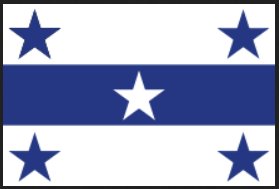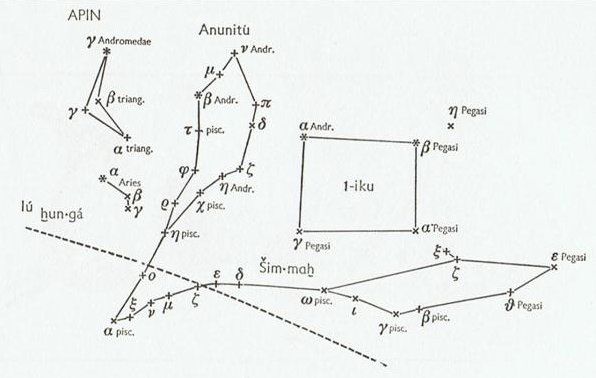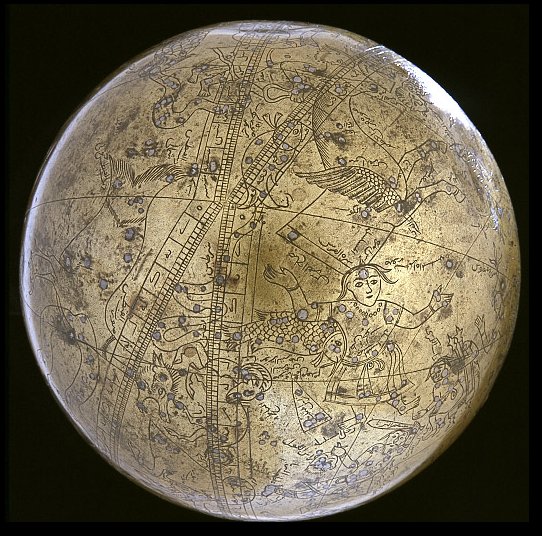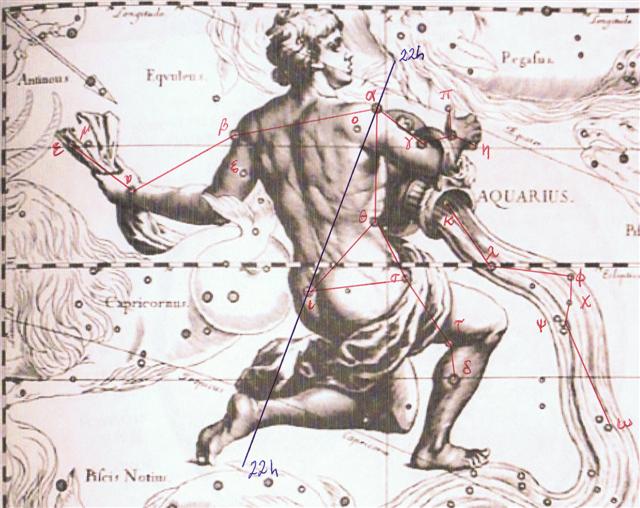95. In the C text we can compare the
description of the current equinox on side a of the tablet with
the solstice presentation a quarter of a year later on side b:
|
JAN 14 (*300) |
15 |
16 (366 + 16 = 382) |
17 |
18 |
88 |
 |
 |
 |
 |
 |
|
*Ca14-1 |
*Ca14-2 |
*Ca14-3 (366) |
*Ca14-4 |
*Ca14-5 |
|
Kua tupu te ata i
te henua |
|
INVISIBLY CLOSE TO THE SUN (helical dates): |
|
March 19 (78) |
20 |
SIRRAH (0h) |
ALGENIB PEGASI |
23 |
|
'Febr 21 (*337) |
22 (52 = 79 - 27) |
TERMINALIA |
24 |
25 |
|
"Febr 6 (37 = 220 - 183) |
7 |
8
(*325 = *366 - 41) |
9 |
10 |
|
CLOSE TO THE FULL MOON (and nakshatra dates): |
|
JULY 15 |
16 (*118) |
17 (199 = 84 + 115) |
18 (200
= 383 - 183) |
19 |
|
Sept 18 |
ο
Virginis (*182) |
ALCHITA (263) |
21 |
GIENAH (*185) |
|
'Aug 22 |
23 |
24 (236 = 263 - 27) |
25 |
26 |
|
"Aug 8 |
9 |
10
(222 = 2 * 111) |
11 |
12 (*144 = *327 - 183) |
|
APRIL 18 (92 + 16) |
19 |
20 |
21 (111 = 175 - 64) |
22 (*32) |
 |
 |
 |
 |
 |
|
Cb3-16 (457) |
Cb3-17 |
Cb3-18 |
Cb3-19 (68) |
Cb3-20 (24 + 45) |
|
henua kua hoi |
kua ka te ahi o te henua |
o te henua kua hoi |
ko te henua kua vero te
ahi |
kiore - henua |
|
INVISIBLY CLOSE TO THE SUN (helical dates): |
|
SOLSTICE
(*92) |
22 (173) |
23 |
ST JOHNS
DAY |
June 25 |
|
'May 25 |
26 (146 = 173 - 27) |
27 |
28 (*68) |
29 |
|
"May 11 |
12
(173 - 41 = 132) |
13 |
14 (*54) |
15 |
|
CLOSE TO THE FULL MOON (and nakshatra dates): |
|
OCTOBER 18 |
19 |
20 |
21 (*214 = *31 + 183) |
22 (295 = 359 - 64) |
|
SOLSTICE |
22
(173 + 183 = 356) |
23 (*94
+ 183 = *277) |
CHRISTMAS
EVE |
December 25 |
|
'October 24 |
25 (356 - 27
= 329) |
26 (*250) |
27 |
28 |
|
"November 10 (314) |
11 |
12 (*236) |
13 |
14 |
Only the top of the henua
glyphs are visible at the beginning of line Ca14.
This type of sign was used in the G text too, viz.
where at the time of the Bull the 'Brand' (Al
Han'ah) rose together with the Sun:
|
17 (107 =
91 + 16) |
APRIL 18 |
19 |
20 (*30) |
21 (111) |
 |
 |
 |
 |
 |
|
Ga1-27 |
Ga1-28 |
Ga1-29 |
Ga1-30 |
Ga2-1 |
|
INVISIBLY CLOSE TO THE SUN (helical dates): |
|
6h (91.3)
ν Orionis (91.4), θ Columbae (91.5), π
Columbae (91.6) |
ξ Orionis
(92.5) |
Al Han'ah-4 /
Maru-sha-pu-u-mash-mashu-7
(Front of the Mouth of the Twins)
TEJAT
PRIOR = η Gemini
(93.4), γ Monocerotis (93.5), κ Aurigae
(93.6), κ Columbae (93.8) |
FURUD
= ζ Canis Majoris
(94.9) |
Well-22 /
Arkū-sha-pu-u-mash-mashu-8 (Back of the
Mouth of the Twins)
δ Columbae (95.2),
TEJAT POSTERIOR = μ Gemini, MIRZAM = β Canis
Majoris
(95.4),
CANOPUS
= α Carinae
(95.6), ε Monocerotis (95.7), ψ1 Aurigae
(95.9) |
|
June 20 |
SOLSTICE |
22 (*93) |
23 (174) |
ST JOHN'S
DAY |
|
°June 16 |
17 (168) |
18 |
19 |
20 (*91) |
|
'May 24 (144) |
25 |
26 |
27 |
28 (*68) |
|
"May 10 (130) |
11 |
12 |
13 |
14 (*54) |
|
CLOSE TO THE FULL MOON (and nakshatra dates): |
|
OCTOBER 17 (290) |
18 |
19 |
20 |
21 (*214) |
|
ZHŌNGSHĀN = ο Herculis
(274.0),
π Pavonis (274.6) |
ι Pavonis
(275.1),
POLIS
= μ Sagittarii
(275.9) |
η Sagittarii
(276.9) |
Purva Ashadha-20 |
|
KAUS MEDIUS = δ Sagittarii,
κ Lyrae (277.5),
TUNG HAE (Heavenly Eastern Sea) = η
Serpentis
(277.7),
SHAOU PIH (Minor Minister) = φ Draconis
(277.8),
KWEI SHE = χ Draconis
(277.9) |
φ Oct. (278.1),
KAUS AUSTRALIS = ε Sagittarii
(278.3), ξ
Pavonis (278.4),
AL ATHFAR = μ Lyrae
(278.6) |
|
December 20 |
SOLSTICE |
22 |
23 (357) |
CHRISTMAS
EVE |
|
°December 16 |
17 |
18 |
19 (*273) |
20 (354) |
|
'November 23 (327) |
24 |
25 |
26 (*250) |
27 |
|
"November 9 |
10 (314) |
11 |
12 (*236) |
13 |
This was the place which Metoro
had explained (in line Ca14) as where the countryside (atahenua)
was growing (kua tupu), rising up into view. Here dawn
(ata) broke the shadows (âta) of the
night.
| Ata
Ata
1. Dawn, first light before sunrise;
ku-hamu-á te ata , dawn has broken;
ku-tehe-á te ata, it's already dawn
(lit.: the lights have flown). 2. Particle
inserted between the imperative prefix ka
and the verb to signify 'well, carefully,
intelligently': ka-ata-hakarivariva,
prepare it well. Between the prefix e
and kahara it expresses 'to make sure
that, to take good care that...' :
e-ata-kahara koe o oona, be careful not
to get dirty; e-ata-kahara koe o kori te
moa o te tahi pa, be sure not to steal
chickens of another property. 3. More:
iti, small; ata iti, smaller;
he-ata-ata iti-iti ró, the smallest of
all. Vanaga.
Âta
1. Shadow: he-veveri te poki, ana tikea
toona âta, the child is frightened at
seeing his shadow; person's reflection (in
mirror, in water): he âta oou-á, it's
your own reflection. 2. To be frightened by
a shadow: he-âta te îka, the fish are
frightened (and they flee) by people's
shadows. Vanaga.
1. Image, picture,
portrait, design; to draw, to paint (shadow
sense). P Mgv: ata, image, likeness,
portrait, shadow of a human being, form,
shape, appearance, imprint, impression. Mq.:
ata, image, statue, portrait, shadow,
surface; to design, to mark. Ta.: ata,
shade, shadow appearance, form,
representation of an object, cloud, cloudy.
2. Transparency, end of day, sunset (bright
sense); e ata, red clouds; ku ata,
transparent; ata mea, ata tea,
ata tehe, dawn, daybreak, sunrise;
ataata, end of day, sunset. P Mgv.:
ata, morning or evening twilight,
daybreak, dawn; ata haihai, evening
twilight, a beautiful sunset; ataiai,
twilight, clouds red with the sunset;
atakurakura, a beautiful sunrise or
sunset; atareureu, dawn, the first
peep of day, morning twilight. Mq.: ata,
to appear, to rise, to shine (of stars);
ata uá, morning twilight; ataata,
diaphanous, transparent. Ta.: ata,
twilight. 3. A designation of space; ata
hakahohonu, abyss; ata hakaneke mai,
nearby, close at hand; ata tapa,
lateral, marginal. 4 ? Ata kimikimi,
to inquire; ata puo, to hill a plant;
ata ui, to examine, to taste.
Churchill.
Atahenua (ata
3 - henua 1), landscape, countryside.
Atakai: 1. Generous, hospitable,
beneficent, indulgent, liberal, obliging;
prodigality, indulgence; rima atakai,
benevolent, generous, open-handed; gift,
liberality. 2. Calm, unperturbed, grateful.
Churchill. Ata-ta T, evening (?
ataata). Atatehe (ata 2 -
tehe 1), dawn; popohaga atatehe,
morning, early in the morning. Churchill. |
The figure in Ga1-29 has his head
missing - not yet visible - and his right arm in a
fluid state, i.e. still in the dark. I was wrong
when I earlier simply saw the wreck of a poor human
being here,
at the current solstice, who had lost his head and
right arm.
Instead, the primary reading was
probably intended to visualize the situation at the
time of the Bull, not the time of rongorongo, nor
the time of the Pope, nor the time of Julius Caesar,
nor the time of Bharani. But these latter time dates
where cleverly singing out in harmony with the
corresponding dates at the time of the Bull. At the
time of rongorongo and the June winter solstice the
old year was at left and the new in front, at the
time of the Bull the stars which returned to
visibility in APRIL 19 had indicated the old year
was at left and the new in front. APRIL 19 (109) -
16 = 93 and *93 = June 22 (173) = 64 + APRIL 19 = 80
+ APRIL 3 (*13):
|
APRIL 1 (91) |
2 |
3 (109 -
16) |
4 (*14) |
 |
 |
 |
 |
|
Ga1-11 |
Ga1-12 |
Ga1-13 |
Ga1-14 |
|
INVISIBLY CLOSE TO THE SUN (helical dates): |
|
HAEDUS II = η Aurigae
(75.9) |
5h (76.1)
ε Leporis (76.0),
CURSA = β Eridani
(76.4), λ Eridani (76.7) |
μ Aurigae, μ Leporis
(77.6) |
ĸ Leporis (78.0),
RIGEL
(Foot)
= β Orionis
(78.1),
Flaming Star = IC405
(78.2),
CAPELLA = α Aurigae
(78.4), ο Columbae, τ Orionis (78.8) |
|
June 4 |
5 |
6 (157) |
7 (*78) |
|
°May 31 (151) |
°June 1 |
2 (*73) |
3 |
|
'May 8 (128) |
9 |
10 (*50) |
11 |
|
"April 24 (114) |
Vaitu Nui 25 (115)
(E:17) |
26 (*36) |
27 |
|
CLOSE TO THE FULL MOON (and nakshatra dates): |
|
OCTOBER 1 |
2 (*195) |
3 (84 +
192) |
4 (277) |
|
17h (258.7)
ARRAKIS = μ Draconis
(258.7) |
Mula-19
SABIK = η Ophiuchi
(259.7),
η Scorpii
(259.9) |
NODUS I = ζ Draconis(260.0),
π Herculis (260.7),
RAS
ALGETHI
= α Herculis
(260.8) |
SARIN = δ Herculis
(261.0), ο Ophiuchi (261.4)
|
|
December 4 |
5 |
6 (340 =
*260 + 80) |
7 |
|
°November 30 |
°December 1 |
2 (*256 = 4 * 64) |
3 |
|
'November 7 (*231) |
8 |
9 |
10 (314) |
|
"October 24 (*217) |
25 |
26 |
27 (300) |
|
... Later on in this series of rituals, the
Chorti go through a ceremony they
call raising the sky. This ritual takes
place at midnight on the twenty-fifth of
April and continues each night until the
rains arrive. In this ceremony two diviners
and their wives sit on benches so that they
occupy the corner positions of the cosmic
square. They take their seats in the same
order as the stones were placed, with the
men on the eastern side and the women on the
west.


The ritual actions of sitting down and
lifting upward are done with great precision
and care, because they are directly related
to the actions done by the gods at Creation.
The people represent the gods of the four
corners and the clouds that cover the earth.
As they rise from
their seats, they metaphorically lift the
sky. If their lifting motion is uneven, the
rains will be irregular and harmful ...
 |
|
... On the twenty-fifth day of the first
month (Vaitu Nui), Ira and
Makoi set sail; on the first day of June
('Maro'), the bow of Ira's
canoe touched land again. Ira's canoe
appeared on the distant horizon, came closer
on its course, and sailed along, and finally
(one) could see the (new home) land. The
canoe reached the islets (off the coast),
and Ira saw that there were three
such islets. Ira said, 'Hey you, crew
of young men, the vision of Hau Maka,
our father, which he revealed to me, has
come true. There are 'the handsome sons of
Te Taanga, who are standing in the
water', for this is the name that the dream
soul of Hau Maka gave them.
Unforgotten (? kai viri kai viri) are
they, these three. And therefore this is the
(right) land lying there; this is Te Pito
O Te Kainga, which also received its
name from the dream soul.' (E:17) |
Similarly we can in C line
up glyph number 366 with JANUARY 16 when the Pegasus
Square was beginning to rise heliacally, to
return to visibility 16 nights after DECEMBER 31
(the true heliacal date). From Scheat (β) and
Markab (α) Pegasi to Sirrah there were 16 days:

Sirrah - the Navel of the Pegasus
Horse - marked the end of the Square as well as the
beginning of the new year (and the birth place of
Maui). Day 366 was day 365 + 1.

16 days earlier than heliacal η
Gemini (Tejat Prior) - with nakshatra η Sagittarii
- was
nakshatra η Pegasi (Al Sa'd al Matar,
the Fortunate Rain) - where evidently
the dry and half-dead from thirst old Henua
was receiving fresh water poured out from Situla, the
mouth of the Water Bucket of
Aquarius.
|
Egyptian courtyard |
 |
Phoenician heth |
 |
Greek eta |
Η (η) |
|
... The
letter shape ultimately goes back to a
hieroglyph for 'courtyard' ... possibly
named
hasir in the Middle Bronze Age
alphabets, while the name goes rather
back to
hayt, the name reconstructed for
a letter derived from a hieroglyph for
'thread'
 |
14 * 29˝ = 413 (as in Ga4-13), and
300 + 96 = 396 (as in the number of the tresses of
Pachamama):
|
ST JOHN'S DAY |
JUNE 25 |
26 (177 = 6 * 29˝) |
27 |
 |
 |
 |
 |
|
Ga4-12 |
4-13 (96) |
Ga4-14 |
Ga4-15 |
|
INVISIBLY CLOSE TO THE SUN (helical dates): |
|
p Carinae
(159.3) |
Φ Hydrae
(160.3) |
no star listed (161) |
VATHORZ POSTERIOR = θ Carinae
(162.1),
PEREGRINI = μ Velorum,
η Carinae (162.6) |
|
August 27 |
28 (240) |
29 (*161) |
30 |
|
°August 23 |
24 (236) |
25 (*157) |
26 |
|
'July 31 |
'August 1 |
2 (214) |
3 (*500) |
|
"July 17 |
Anakena 18 (199)
(E:23) |
19 (200 = 115 + 85) |
20 (*121) |
|
CLOSE TO THE FULL MOON (and nakshatra dates): |
|
CHRISTMAS EVE |
DECEMBER 25 |
26 (360) |
27 |
|
η Aquarii
(342.1), σ Gruis
(340.4),
SITULA
= κ Aquarii
(342.7) |
ε Piscis
Austrini (343.5), ο Pegasi, β Gruis (343.8) |
ρ Gruis (344.0),
MATAR
(Fortunate Rain)
=
η Pegasi
(344.2), η Gruis (344.6), β Oct. (344.7) |
λ Pegasi
(345.0), ξ Pegasi (345.1), ε Gruis (345.3),
τ Aquarii (345.7), ξ Oct. (345.8), μ Pegasi
(345.9) |
|
February 26 |
27 (58) |
28 (424) |
March 1 (*345) |
|
°February 22 (53) |
TERMINALIA |
24 (420) |
25 |
|
'January 30 (*315) |
31 |
'February 1 (32) |
2 |
|
"January 16 (*301) |
17 |
18 (383) |
19 |
|
On the eighteenth day of the month of July
('Anakena') they went on from
Hanga Takaure. (E:23) |

|

















